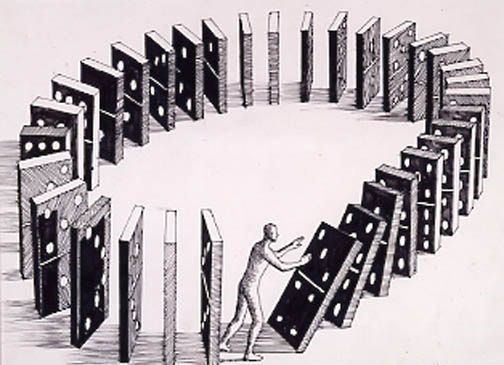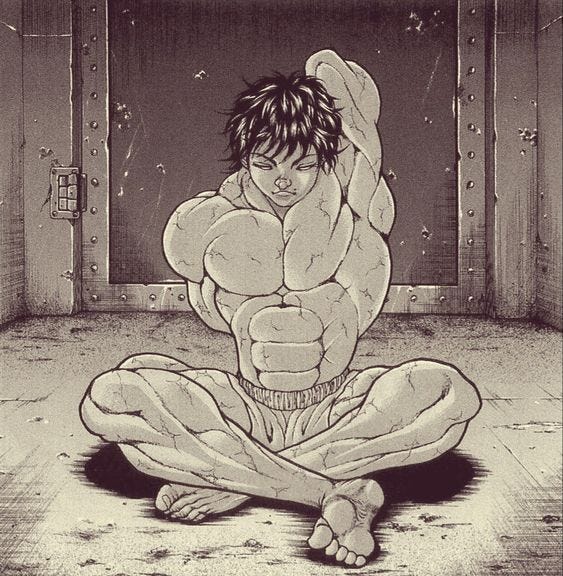If you ever LACK THE MOTIVATION TO TRAIN, think about this...
The Pen and Sword Journal - Vol 26
If you ever lack the motivation to train, think of what happens to your mind and body if you don’t. This reflection will be a great source of discipline for you.
When you're feeling less motivated, the choice to skip a workout may seem inconsequential. Yet, the decision to skip a training session has consequences that extend beyond the immediate moment. In those times of wavering motivation, it's crucial to pause and reflect on what happens to both mind and body when we choose not to engage in physical activity. For this reason, in this article, I will delve into the intricate relationship between physical activity and physical plus mental well-being. By reminding ourselves constantly of the ripple effects of inaction, we find a source of motivation and discipline that goes beyond the temporary emotional boost that often comes after seeing an inspiring movie.
Emotional vs. Mental Inspiration
As a child and during my teenage years, watching a great martial arts movie would fill me with strong emotions and inspiration. However, this inspiration was purely emotional, unlike what I like to refer to as mental inspiration, which has a longer-lasting impact.
Emotional inspiration creates an intense psychological state that influences our actions but tends to fade within a few days. On the other hand, mental inspiration sparks new ideas and visions to explore. While it may not be as intense as emotional inspiration, it engages our minds, inspiring more actions and experiments. This is the type of inspiration I discussed in my previous article, What is the real meaning of BUSHIDŌ?.
The Mind-Body Connection
Exercise is not solely about sculpting muscles or shedding weight; it's a powerful remedy for mental strength. When you engage in physical activity, your body releases endorphins, neurotransmitters known for their mood-boosting properties, often referred to as the "feel-good" hormones. Skipping a workout denies your mind this natural stress-relief mechanism, potentially leaving you susceptible to anxiety and depression. Consequently, by forgoing exercise, we miss a chance to foster a sense of well-being and mental clarity.
In addition to numerous supporting studies, I can attest to this through personal experiences and cases I've encountered. My own battle with depression during my teenage years, as detailed in a previous article, saw a significant improvement in my mood and thought quality when I began my Muay Thai classes.
A friend of mine went through a positive change about ten months ago. She used to have a lot of anxiety and panic attacks. By combining therapy with starting weight training at a gym, she significantly improved. Now, she doesn't go to therapy sessions anymore; instead, she works out at the gym three times a week. It's been around six months since her last panic attack, and her anxiety is much more manageable.
When we choose inaction, we open the door to a downward spiral of negative effects. The absence of physical activity can cause a noticeable dip in energy levels, leading to feelings of lethargy and a pervasive lack of motivation. This creates a self-perpetuating cycle where inertia sets in, making it increasingly challenging to gather the enthusiasm needed to resume regular exercise. Moreover, this lethargy can easily turn into a cycle where the absence of physical activity results in lower energy levels, making it even harder to find the motivation to begin exercising again.
The Body's Response to Inaction
Our bodies are intricate systems where physical and mental health are deeply intertwined. For instance, research indicates that a significant portion of Irritable Bowel Syndrome cases is attributed to stress and psychological issues. The connection between our mind and the gut is profound, with the gut being directly impacted by our emotional state. Furthermore, when our gut functions improperly, it leads to malabsorption, depriving our body of essential nutrients. This not only contributes to health issues but also hampers brain performance, initiating another detrimental vicious cycle.
As the ancient sages proclaimed, life influences form, and form influences life, meaning the body influences the mind, and the mind influences the body.
When you neglect regular exercise, you expose yourself to a host of physical consequences. Weight gain becomes a looming threat, and your immune system weakens, leaving you susceptible to illnesses. Chronic health issues may start to take root, casting a long shadow over your overall well-being.
The Domino Effect:
Not taking action leads to becoming too comfortable, and your fitness or martial arts goals may start to fade away as you delay the efforts needed to reach them. Each missed training session inches you further away from the fit, strong, and healthy version of yourself you aspire to become. The domino effect of inaction becomes apparent as your commitment to exercise wavers, and the benefits you once enjoyed begin to dissipate.
Whenever I began something new, like starting a training program, a work project, a hobby, or anything else, I almost always felt a surge of emotional inspiration in the first week. As that emotional boost started to fade, I entered a phase of about a month or a bit more where I had to discipline myself to keep going because it was a promise to myself and the right thing to do. Afterward, something wonderful happened – this practice became such a deep part of my life and routine that my body and mind started to crave it.
Many times, we need to invest effort and work in our training so that it can, in turn, become a beneficial and ingrained part of our lives.
Additionally, leading a sedentary lifestyle isn't just about being physically inactive; it also encourages a feeling of complacency that spreads to other aspects of our lives. As we postpone the necessary efforts required to reach our goals, the once vivid ambitions in our minds slowly lose their strength.
Our ambitions must be fed daily, with dedication, love, sweat and even blood if necessary. If we do not feed our aspirations daily, they will start to die off.
Breaking the Cycle:
It's essential to recognize that opting out of a workout is not a neutral decision; it's a step backward. Understanding this is a crucial step towards breaking the cycle of inaction. Recognize that with every workout, you're not just building your body; you're nurturing your mind and spirit. This knowledge can serve as a powerful motivator, encouraging you to stay committed to your training regimen.
Establish a daily minimum that you won’t break no matter what
Image from “Baki the Grappler” manga, by Keisuke Itagaki.
It is crucial to be realistic when planning your training routine. Consider other activities and responsibilities you have in your life. For instance, if you decide, inspired by an amazing karate movie, to train for three hours a day, the reality of your responsibilities will soon kick in. As the effect of the initial emotional boost fades, you may find it challenging to maintain that pace. Repeatedly failing to meet an unrealistic schedule can lead to a decline in motivation and may even affect your confidence. In such cases, it's wise to recognize when you are under the influence of emotional inspiration. Use it to drive your actions but don't let it cloud your judgment. If you initially aim to train for three hours a day, consider scaling it down to one or even half an hour a day. Establish this shorter duration as the minimum you will complete six times a week, no matter what. If on a particular day you can do more, such as two hours, feel free to go for it, but never break your daily minimum.
Long-Term Well-Being:
When motivation wavers, it's helpful to keep the long-term perspective in mind. The effort invested in today's workout will yield dividends for both the body and mind in the days and years to come. It's about embracing the knowledge that exercise is not merely a physical activity but a holistic approach to self-care.
Keep your long-term well-being at the forefront of your mind. The effort you invest in your workouts today isn't just for immediate gains; it's an investment in your future self. Regular exercise contributes to a healthier body, a sharper mind, and an overall enhanced quality of life. Think about the lasting benefits of your actions, and let that viewpoint be the driving force that encourages you to stick to your commitment to staying active. This has to do with the mental inspiration that I was talking at the beginning.
Next time you feel the urge to stay on the couch due to inertia, think about the broad impact of deciding not to exercise. Recognize that it's not just about the temporary discomfort or the effort needed, but about protecting your mental and physical health. Let this realization inspire you to stay dedicated to your training routine, understanding that the advantages go beyond physical changes to include a strong mind and a healthier spirit.
Conclusion
In conclusion, the decision to skip a training session is not a harmless choice—it's a compromise that reverberates through your entire being. By embracing the understanding that exercise is a holistic endeavor, you empower yourself to make choices that contribute to a healthier and more fulfilling life. So, let the awareness of the consequences of inaction be your driving force, propelling you forward on the path to a stronger, healthier, and more vibrant you.
🙏 Appreciate you for reading
If you enjoy my Pen and Sword Journal writing, you can show your support in various ways without any cost by subscribing, liking this post, leaving a comment if you have thoughts to share, or simply sharing it with anyone who might find it interesting.
By subscribing for free, you will receive every week an article the covers topics about warrior psychology and philosophy like this one.
Alternatively, if you wish to contribute more significantly and help sustain the continuous research and daily content creation, you can become a paid supporter of Pen and Sword Journal at just $5 per month.
What you get by becoming a paid supporter is access to extra members-only essays, such as “Mushin 無心: The Samurai Alternative”, or “STRIKE FIRST: Exploring the Strategic Application of a Seizing-The-Moment Mindset”, access to all the archive, as well as an opportunity to recommend topics for future essays.
Your generous contribution means a lot to me, because diving deeper into warrior psychology and human potential is my passion and one of my life purposes, and your support enables me to devote more time to researching and writing high-quality content regularly.
🔻📕Additional Resources:
If you've found the philosophy of the warrior spirit inspiring and want to delve deeper into this subject, I recommend checking out my book, "100 Thoughts for the Inner Warrior."
Whether you're seeking personal growth, to fortify your inner strength and mental resilience, or simply a deeper understanding of the warrior ethos, "100 Thoughts for the Inner Warrior" is a valuable resource that can guide you on your journey. You can find more information about the book and how to get your Paperback or Kindle copy here, and if you like the Hardcover version, you can get it here.
👉 Furthermore, you can consider joining my WhatsApp channel via this link if you don’t want to miss future updates.
Wish you a year full of growth, inner work, health and happines for you and your loved ones! 🙏😊








thank you that was deeply inspirational, at 65 y.o. the tendency seems more pronounced to consider inactivity a "harmless well deserved break" but of course its NOT, thanks for reminding me